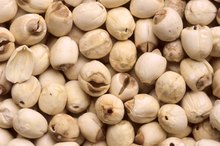Beans & Blood Sugar
If you are a diabetic or if you just want to lose weight and keep it off, you can benefit from understanding the role your blood sugar and insulin release plays on your health and fitness. Many people know that beans are a healthful food, but since beans are a predominantly a carbohydrate source, you may be curious just what kind of effect beans have your blood sugar levels.
Beans Have a Low Glycemic Load
The glycemic index is a numerical ranking scale that rates a food or a beverage on how much it is likely to effect your blood sugar levels. While the glycemic index is useful, according to Dr. Jonny Bowden, Ph.D., and Clinical Nutrition Specialist, the "glycemic load" is a superior measuring stick to predict the effect that a food will have on your blood sugar levels. The glycemic load measures the glycemic index of a food and the amount of carbohydrate a food has. The scale ranges from 0 to 40. Foods ranked 10 and below have a low glycemic load and will not significantly raise your blood sugar. Baked beans, black beans and kidney beans all have a very low glycemic load of 7 and will not raise your blood sugar.
Glycemic Control
Pinto Beans in Low Carb Diets
Learn More
Dr. Jonny Bowden refers to beans as the "ultimate blood sugar regulator" because they are so rich in dietary fiber. While nearly all beans have a low glycemic load ranking and will not raise your blood sugar, the fiber in beans will also help lower and stabilize your blood sugar if you eat other higher glycemic index foods. The fiber, specifically the soluble fiber, prevents glucose from other foods and beverages from digesting in your body as quickly. In turn, this prevents your blood sugar and insulin level from increasing. The glycemic advantages that beans offer make them ideal glycemic control foods for diabetics and dieters.
Appetite Control
Another benefit of the dietary fiber in beans is appetite suppression. According to a study at the University of California at Davis published in the "American Journal of Clinical Nutrition," dietary fiber increases feelings of fullness and levels of a hormone associated with satiety or feeling satisfied from food. By satisfying your appetite, you are less likely to crave sugary or sweet foods and desserts that will raise your blood sugar levels. Eating beans can be especially helpful if you tend to crave sweets after meals.
Considerations
Chick Peas & Blood Sugar
Learn More
Even though beans can stabilize your blood sugar, it doesn't mean you can automatically pair them with foods high on the glycemic index. Fiber from beans will not prevent hyperglycemia. Additionally, while beans can help keep your blood sugar more stable, the dietary fiber alone will not make you lose weight. In order to lose weight, you will still have to consume less calories than you expend as energy. According to the Colorado State University, the average American only consumes 14 grams of fiber a day, far lower than the recommended levels of 25 to 35 grams. No matter what your health and fitness goals are, eating beans will certainly not deter your progress.
Related Articles
References
Writer Bio
Jenna Cee has been writing professionally since 2006. Her articles appear on 2Athletes.com and Women's Fitness Online. She is a personal trainer certified by the National Academy of Sports Medicine and as a fitness and sports nutritionist through the International Sports Sciences Association. Cee holds a Master of Science in human nutrition from Washington State University.









